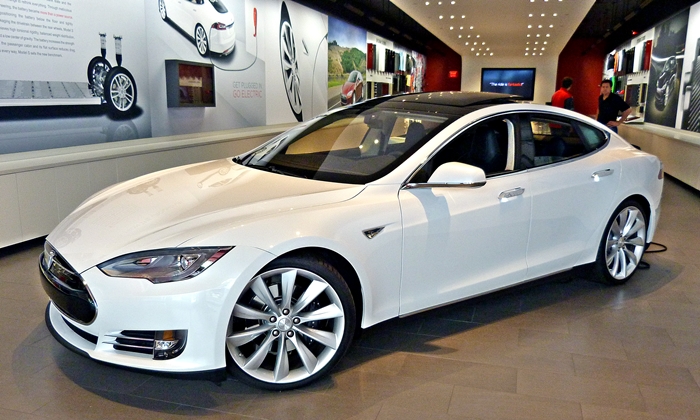Consumer Reports released their updated reliability ratings today in a presentation to the Detroit-based Automotive Press Association (APA). Their rating for the Tesla Model S finally (almost) agrees with what TrueDelta has been reporting for the past six quarters, and they will no longer recommend the car.
 Specifically, the predicted reliability for the Model S based on the 2013-2015 model years is now 43% worse than average, deep into “half-black” territory and only two percentage points short of the dreaded big black dot. In previous years the Model S has been within 20% of the average, and so “about average” and recommendable as long as the car had a good road test score. The Model S has earned outstanding road test scores, the best in the history of Consumer Reports’s testing.
Specifically, the predicted reliability for the Model S based on the 2013-2015 model years is now 43% worse than average, deep into “half-black” territory and only two percentage points short of the dreaded big black dot. In previous years the Model S has been within 20% of the average, and so “about average” and recommendable as long as the car had a good road test score. The Model S has earned outstanding road test scores, the best in the history of Consumer Reports’s testing.
In TrueDelta’s stats the Model S has long been well over twice the average repair frequency, even over three times. The difference is that we ask owners to report all repairs and not only “problems you considered serious.” Many Tesla owners, especially those who bought their cars back in 2012 and 2013, have been avid fans of the brand. They understood that this was an all-new company producing an all-new car with all-new tech, and cut Tesla a healthy amount of slack. Also, Tesla has provided outstanding service when repairs have been needed. Both factors have caused many problems that would be reported on our survey to not be reported (since they were not considered serious by owners) on the Consumer Reports survey.
However, as Tesla has had to pull more and more from the population of regular car buyers rather than early adopters, and as time elapses and people increasingly expect them to have ironed out early issues and learn what they’re doing, the “fan” factor can be expected to weaken. I believe this is why the Consumer Reports rating has changed, rather than any actual increase in the number of problems the cars have been having.
Based on TrueDelta’s data, the opposite is actually the case, but not to a large enough extent. In the past year the repair frequency of the Model S has decreased by perhaps 20 percent. Better than before, but still much worse than the average.